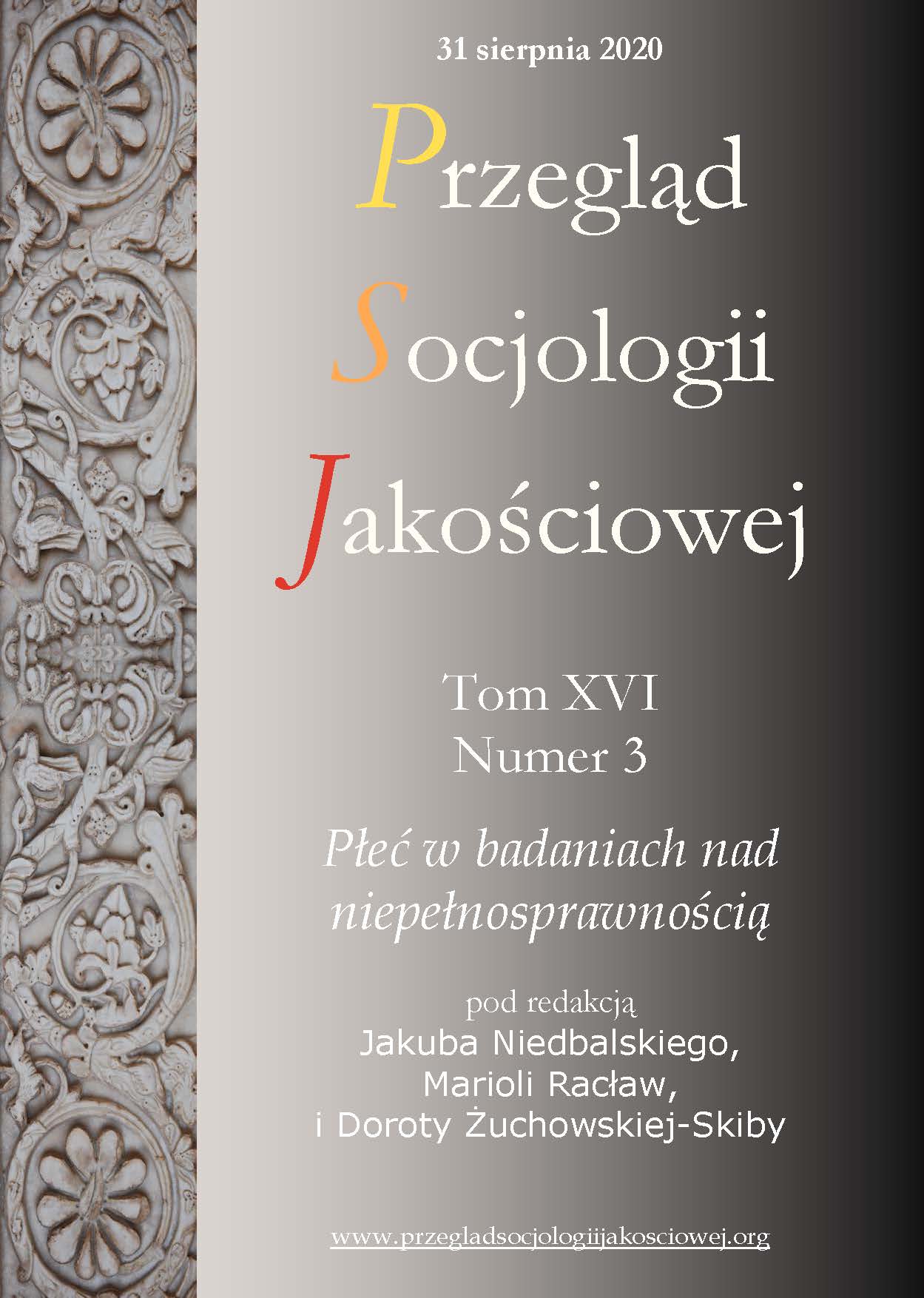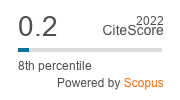Towards Reflection, Inclusiveness, and Diversity: The Importance of Gender in Disability Studies
DOI:
https://doi.org/10.18778/1733-8069.16.3.01Keywords:
gender, disability studies, anti-essentialism, intersectionality, constructivismAbstract
The aim of the article is to introduce the subject of this special issue devoted to showing the meaning of gender, which – in relation to disability and other demographic and social factors – affects the constructed identities and fulfilled social roles of people with disabilities. This undertaking required demonstrating the methodological trends that are present in the tradition of research on disability, as well as following the research approaches that seem to predominate today. The analysis made it possible to notice a departure in recent decades from treating disability as the superior category that allows one to explain all the aspects of the functioning of people with disabilities. Such a category has been replaced by the perception of the mutual influence of various demographic and social factors determining the social situation of people with disabilities. This trend is noticeable in gender studies conducted as part of disability studies. They reject the essentialist approach and move towards constructivist and intersectional analyses. Such an attitude makes it possible to reveal the multidimensionality and complexity of the phenomenon of disability itself, which – in relation to a person – eludes the simple ‘able/disabled’ dichotomy.
Downloads
References
Arnade Sigrid, Haefner Sabine (2011) Standard Interpretation of the UN Convention on the Rights of Persons with Disabilities (CRPD) from a Female Perspective [dostęp 20 lipca 2020 r.]. Dostępny w Internecie: http://nw3.de/attachments/artic-le/100/100_crpd_interpretation_women_and_gender_provisions_nw3-de_2011.pdf
Google Scholar
Asch Adrienne, Michelle Fine (1988) Introduction: Beyond pedestals [w:] Fine Michelle, Asch Adrienne, eds., Women with disabilities: Essays in psychology, culture, and politics. Philadelphia: Temple University Press, s. 1–37.
Google Scholar
Aune Gunnbjørg (2013) Everyday Challenges for Mothers with Spinal Cord Injury: A Qualitative Study. „Scandinavian Journal of Disability Research”, no. 2 (15), s. 185–198.
Google Scholar
DOI: https://doi.org/10.1080/15017419.2012.692708
Barnes Colin (2012) Understanding the social model of disability: past, present and future [w:] Watson Nick, Roulstone Allan, Thomas Carol, eds., Routledge Handbook of Disability Studies. London, New York: Routledge, s. 12–29.
Google Scholar
Barnes Colin, Mercer Geof (2008) Niepełnosprawność. Przełożył Piotr Morawski. Warszawa: Sic.
Google Scholar
Begum Nasa (1992) Disabled women and the feminist agenda. „Feminist Review”, no. 40, s. 70–84.
Google Scholar
DOI: https://doi.org/10.1057/fr.1992.6
Begum Nasa (1994) Mirror, Mirror on the Wall [w:] Begum Nasa, Hill Mildrette, Stevens Andy, eds., Reflections: Views of black disabled people on their lives and community care. London: Central Council for Education and Training in Social Work, s. 17–36.
Google Scholar
Bhaskar Roy, Danermark Berth (2006) Metatheory, Interdisciplinarity and Disability Research: A Critical Realist Perspective. „Scandinavian Journal of Disability Research”, no. 4(8), s. 278–297.
Google Scholar
DOI: https://doi.org/10.1080/15017410600914329
Bowleg Lisa (2008) When Black + lesbian + woman ≠ Black lesbian woman: The methodological challenges of qualitative and quantitative intersectionality research. „Sex Roles: A Journal of Research”, no. 5−6 (59), s. 312–325.
Google Scholar
DOI: https://doi.org/10.1007/s11199-008-9400-z
Christensen Ann-Dorte, Jensen Sune Q. (2012) Doing Intersectional Analysis: Methodological Implications for Qualitative Research. „Nordic Journal of Feminist and Gender Research”, no. 2 (20), s. 109–125.
Google Scholar
DOI: https://doi.org/10.1080/08038740.2012.673505
Ciaputa Ewelina, Król Agnieszka, Warat Marta (2014) Genderowy wymiar niepełnosprawności. Sytuacja kobiet z niepełnosprawnościami wzroku, ruchu i słuchu [w:] Gąciarz Barbara, Rudnicki Seweryn, red., W Polscy niepełnosprawni: od kompleksowej diagnozy do nowego modelu polityki społecznej. Kraków: Wydawnictwa AGH, s. 153–174.
Google Scholar
Ciaputa Ewelina i in. (2014) Macierzyństwo kobiet z niepełnosprawnościami ruchu, wzroku i słuchu. „Studia Socjologiczne”, nr 2 (213), s. 203–255.
Google Scholar
Cieślikowska Dominika, Sarata Natalia (2012) Dyskryminacja wielokrotna – historia, teorie, przegląd badań [dostęp 17 lipca 2020 r.]. Dostępny w Internecie: http://www.tea.org.pl/userfiles/file/Wielokrotna.pdf
Google Scholar
Colligan Sumi E. (1999) Where in Lie the “Secrets of Life”?: An Argument Against Biological Essentialism. „International Journal of Sexuality and Gender Studies”, no. 4, s. 73–85.
Google Scholar
DOI: https://doi.org/10.1023/A:1023206524922
Corker Mairian, French Sally (1999) Disability Discourse. Buckingham: Open University Press.
Google Scholar
Corker Mairian, Shakespeare Tom (2002) Disability/Postmodernity: Embodying Disability Theory. London: Continuum.
Google Scholar
Crenshaw Kimberle (1991) Mapping the Margins: Intersectionality, Identity Politics, and Violenceagainst Women of Color. „Stanford Law Review”, no. 6 (43), s. 1241–1299.
Google Scholar
DOI: https://doi.org/10.2307/1229039
Crenshaw Kimberle (1992) Whose story is it anyway? Feminist and antiracist appropriations of Anita Hill [w:] Morrison Toni, ed., Race-ing Justice, Engendering Power. New York: Pantheon, s. 402−440.
Google Scholar
Davis Kathy (2008) Intersectionality as Buzzword: A Sociology of Science Perspective on What Makes a Feminist Theory Successful. „Feminist Theory”, no. 1 (9), s. 67–85.
Google Scholar
DOI: https://doi.org/10.1177/1464700108086364
Deegan Mary J. (1985) Multiple minority groups: a case study of physically disabled women [w:] Deegan Mary J., Brooks Nancy A., eds., Women and Disability: the double handicap. Oxford: Transaction Books, s. 37–55.
Google Scholar
DOI: https://doi.org/10.4324/9781351318082-4
Dostępność usług ginekologicznych – raport z badania [dostęp 20 lipca 2020 r.]. Dostępny w Internecie: https://www.kulawawarszawa.pl/dostepnosc-uslug-ginekologicznych-dla-kobiet-z-niepelnosprawnosciami/ Erevelles Nirmala (2011) Disability and Difference in Global Contexts: Enabling a Transformative Body Politic. New York: Palgrave Macmillan.
Google Scholar
Erevelles Nirmala, Alison Kafer (2010) Committed Critique: An Interview with Nirmala Erevelles [w:] Burch Susan, Kafer Alison, eds., Deaf and Disability Studies. Washington, DC: Gallaudet University Press, s. 204–221.
Google Scholar
Feely Michael (2016) Disability studies after the ontological turn: a return to the material world and material bodies without a return to essentialism. „Disability and Society”, no. 7, s. 863–883.
Google Scholar
DOI: https://doi.org/10.1080/09687599.2016.1208603
Forber-Pratt Anjali J. i in. (2017) Disability identity development: A systematic review of the literature. „Rehabilitation Psychology”, no. 2(62), s. 198−207.
Google Scholar
DOI: https://doi.org/10.1037/rep0000134
Forber-Pratt, Anjali J. (2019) (Re)Defining Disability Culture: Perspectives from the Americans with Disabilities Act Generation. „Culture and Psychology”, no. 2 (25), s. 241–256.
Google Scholar
DOI: https://doi.org/10.1177/1354067X18799714
Galvin Rose (2003) The Paradox of Disability Culture: The need to combine versus the imperative to let go. „Disability and Society”, no. 5 (18), s. 675–690.
Google Scholar
DOI: https://doi.org/10.1080/0968759032000097889
Garland-Thomson Rosemary (2005) Feminist Disability Studies. „Signs. Journal of Women in Culture and Society”, no. 2 (30), s. 1557–1587.
Google Scholar
DOI: https://doi.org/10.1086/423352
Gerschick Thomas J. (2000) Toward a Theory of Disability and Gender. „Signs”, no. 4 (25), s. 1263–1268.
Google Scholar
DOI: https://doi.org/10.1086/495558
Goethals Tina, De Schauwer Elisabeth, Van Hove Geert (2015) Weaving Intersectionality into Disability Studies Research: Inclusion, Reflexivity and Anti-Essentialism. „DiGeSt. Journal of Diversity and Gender Studies”, no. 1–2, s. 75–94.
Google Scholar
DOI: https://doi.org/10.11116/jdivegendstud.2.1-2.0075
Goodley Dan (2010) Disability Studies: an Interdisciplinary Introduction. London: Sage.
Google Scholar
Goodley Dan (2013) Dis/entangling Critical Disability Studies. „Disability and Society”, no. 5 (28), s. 631–644.
Google Scholar
DOI: https://doi.org/10.1080/09687599.2012.717884
Jenkins Richard (1991) Disability and Social Stratifications. „The British Journal of Sociology”, no. 4 (42), s. 557–580.
Google Scholar
DOI: https://doi.org/10.2307/591447
Król Agnieszka (2018) Niepełnosprawność i sprawiedliwość reprodukcyjna. Zarys wybranych zagadnień dotyczących kobiet z niepełnosprawnościami. „Annales Universitatis Paedagogicae Cracoviensis. Studia de Cultura”, nr 1 (10), s. 84–99.
Google Scholar
DOI: https://doi.org/10.24917/20837275.10.1.7
Kumanicka-Wiśniewska Agnieszka (2006) Kim jestem? Tożsamość kobiet upośledzonych umysłowo. Warszawa: Wydawnictwo Żak.
Google Scholar
Lang Raymond (2001) The Development and Critique of the Social Model of Disability [dostęp 20 czerwca 2020 r.]. Dostępny w Internecie: http://www.ucl.ac.uk/lcccr/lccstaff/raymondlang/deve-lopmment_and_critique_of_the_social_model_of_d.pdf
Google Scholar
McCall Leslie (2005) The Complexity of Intersectionality. „Signs: Journal of Women in Culture and Society”, no. 3 (30), s. 1771–1800.
Google Scholar
DOI: https://doi.org/10.1086/426800
McRuer Robert (2013) Compulsory Able-Bodiedness and Queer/Disabled Experience [w:] Lennard J. Davis, ed., The Disability Studies Reader. New York, London: Routledge, s. 369–380.
Google Scholar
Meekosha Helen, Shuttleworth Russell (2009) What’s So “Critical” about Critical Disability Studies? „Australian Journal of Human Rights”, no. 1 (15), s. 47–76.
Google Scholar
DOI: https://doi.org/10.1080/1323238X.2009.11910861
Mikołajczyk-Lerman Grażyna (2013) Między wykluczeniem a integracją: realizacja praw dziecka niepełnosprawnego i jego rodziny. Analiza socjologiczna. Łódź: Wydawnictwo UŁ.
Google Scholar
DOI: https://doi.org/10.18778/7525-927-8
Nash Jennifer C. (2008) Re-thinking Intersectionality. „Feminist Review”, no. 89, s. 1–15.
Google Scholar
DOI: https://doi.org/10.1057/fr.2008.4
Northcott Rebekah, Chard Gill (2000) Sexual Aspects of Rehabilitation: The Client’s Perspective. „British Journal of Occupational Therapy”, no. 9 (63), s. 412–18.
Google Scholar
DOI: https://doi.org/10.1177/030802260006300902
Nygaard Ingrid, Bartscht Karen D., Cole Sandra (1990) Sexuality and reproduction in spinal cord injured women. „Obstetrical and Gynecological Survey”, no. 45, s. 727–732.
Google Scholar
DOI: https://doi.org/10.1097/00006254-199011000-00002
Oliver Michael (1990) The Politics of Disablement: A Sociological Approach. London: Macmillan Press Ltd.
Google Scholar
DOI: https://doi.org/10.1007/978-1-349-20895-1
Palęcka Alicja, Szczodry Helena (2011) Hipermacierzyństwo. Na przykładzie matek osób z niepełnosprawnością intelektualną [w:] Polęcka Alicja, Szczodry Helena, Warat Marta, red., Kobiety w społeczeństwie polskim. Kraków: Wydawnictwo Uniwersytetu Jagiellońskiego, s. 17–42.
Google Scholar
Parker Malorie G., Yau Matthew K. (2012) Sexuality, identity and women with spinal cord injury. „Sexuality and Disability”, no. 30(1), s. 15–27.
Google Scholar
DOI: https://doi.org/10.1007/s11195-011-9222-8
Paterson Kevin, Hughes Bill (1997) The social model of disability and the disappearing body: towards a sociology of impairment. „Disability and Society”, no. 12, s. 325–340.
Google Scholar
DOI: https://doi.org/10.1080/09687599727209
Price Jane, Shildrick Margrid (1998) Uncertain Thoughts on the Disabled Body [w:] M. Shildrick Margrid, Price Jane, eds., Vital Signs: Feminist Reconfigurations of the Biological Body. Edinburgh: Edinburgh University Press, s. 228−237.
Google Scholar
Singh Roop, Sharma Sansar C. (2005) Sexuality and women with spinal cord injury. „Sexuality and Disability”, no. 23, s. 21–33.
Google Scholar
DOI: https://doi.org/10.1007/s11195-004-2077-5
Söder Marten (2009) Tensions, Perspectives and Themes in Disability Studies. „Scandinavian Journal of disability Research”, no. 2 (11), s. 67–81.
Google Scholar
DOI: https://doi.org/10.1080/15017410902830496
Stetler Żaneta (2014) Sposób realizacji roli rodzicielskiej wobec dziecka niepełnosprawnego intelektualnie. „Polskie Forum Psychologiczne”, nr 1 (19), s. 87–109.
Google Scholar
Thomas Carol (1999) Female Forms: experiencing and understanding disability. Buckingham: Open University Press.
Google Scholar
Wiszejko-Wierzbicka Dorota, Mariola Racław, Agnieszka Wołowicz-Ruszkowska, red. (2018) Byliśmy jak z kosmosu. Między (nie)wydolnością środowiska a potrzebami rodziców z niepełnosprawnościami. Warszawa: ISP.
Google Scholar
Witkowska Małgorzata, Imielski Wojciech (2018) Społeczna percepcja kobiety z niepełnosprawnością – w poszukiwaniu kobiecej tożsamości. „Ogrody Nauk i Sztuk”, nr 8, s. 285–294.
Google Scholar
DOI: https://doi.org/10.15503/onis2018.285.294
Wołowicz-Ruszkowska Agnieszka (2013) Zanikanie. Trajektorie tożsamości kobiet z niepełnosprawnością. Warszawa: Wydawnictwo Akademii Pedagogiki Specjalnej.
Google Scholar
Yuval-Davis Nira (2006) Intersectionality and Feminist Politics. „European Journal of Women’s studies”, no. 3 (13), s. 193–209.
Google Scholar
DOI: https://doi.org/10.1177/1350506806065752
Downloads
Published
How to Cite
Issue
Section
License

This work is licensed under a Creative Commons Attribution-NonCommercial-NoDerivatives 4.0 International License.














